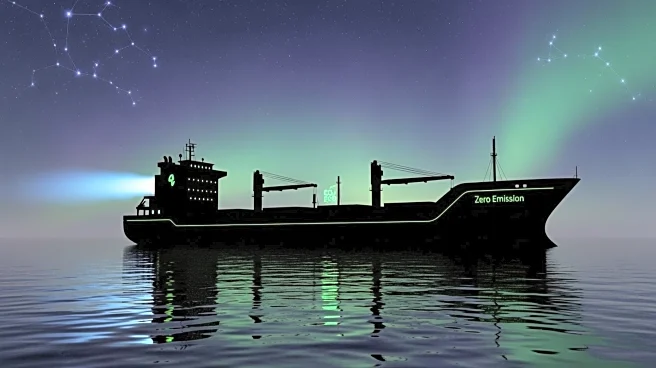What's Happening?
A report by the UCL Energy Institute, Global Maritime Forum, and Climate High-Level Champions highlights the shipping industry's slow adoption of scalable zero-emission fuels (SZEF), despite technological advancements. Methanol engines are commercially available, and ammonia engines are nearing final testing stages, yet demand remains low. The report warns that the industry could fall short of its 5% clean fuel target by 2030, potentially missing the broader 2050 net-zero goal. The International Maritime Organization (IMO) has set a framework requiring ships over 5,000 gross tonnes to reduce greenhouse gas emissions intensity by 30% by 2035 and 65% by 2040, compared to 2008 levels. Non-compliant vessels face financial penalties. The report calls for stronger policy signals and incentives to boost SZEF adoption and align supply, demand, and finance.
Why It's Important?
The shipping industry is a significant contributor to global greenhouse gas emissions, accounting for about 3% of the total. As global trade is expected to quadruple by 2050, the industry's emissions could rise sharply without urgent action. The slow adoption of zero-emission fuels poses a risk to achieving international climate goals, including the IMO's 2050 net-zero target. The report underscores the need for early adoption incentives and stronger policy frameworks to encourage investment in zero-emission technologies. Failure to meet the 2030 target could hinder the development of necessary infrastructure and supply chains, delaying the transition to cleaner fuels and impacting global efforts to combat climate change.
What's Next?
The shipping industry may see increased pressure from environmental groups and policymakers to accelerate the adoption of zero-emission fuels. The IMO's guidelines, expected to be finalized by 2027, could provide clearer incentives for early adopters. Stakeholders, including shipping companies and governments, may need to collaborate on developing supportive policies and financial mechanisms to facilitate the transition. The industry could also face increased scrutiny and potential regulatory actions if progress remains slow, prompting further innovation and investment in sustainable maritime technologies.










